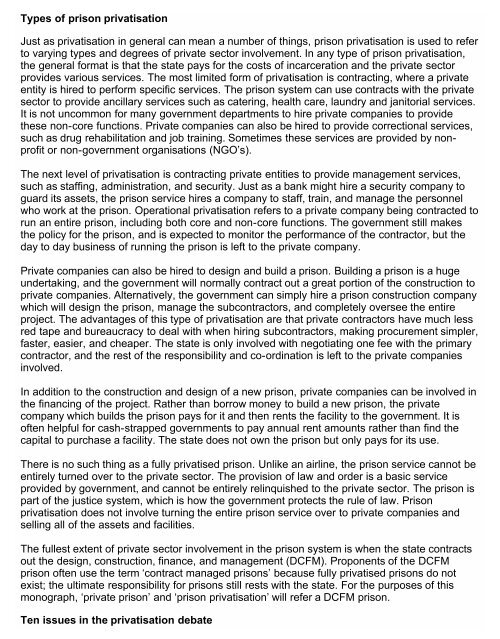prison privatisation in south africa issues, challenges and ...
prison privatisation in south africa issues, challenges and ...
prison privatisation in south africa issues, challenges and ...
You also want an ePaper? Increase the reach of your titles
YUMPU automatically turns print PDFs into web optimized ePapers that Google loves.
Types of <strong>prison</strong> <strong>privatisation</strong><br />
Just as <strong>privatisation</strong> <strong>in</strong> general can mean a number of th<strong>in</strong>gs, <strong>prison</strong> <strong>privatisation</strong> is used to refer<br />
to vary<strong>in</strong>g types <strong>and</strong> degrees of private sector <strong>in</strong>volvement. In any type of <strong>prison</strong> <strong>privatisation</strong>,<br />
the general format is that the state pays for the costs of <strong>in</strong>carceration <strong>and</strong> the private sector<br />
provides various services. The most limited form of <strong>privatisation</strong> is contract<strong>in</strong>g, where a private<br />
entity is hired to perform specific services. The <strong>prison</strong> system can use contracts with the private<br />
sector to provide ancillary services such as cater<strong>in</strong>g, health care, laundry <strong>and</strong> janitorial services.<br />
It is not uncommon for many government departments to hire private companies to provide<br />
these non-core functions. Private companies can also be hired to provide correctional services,<br />
such as drug rehabilitation <strong>and</strong> job tra<strong>in</strong><strong>in</strong>g. Sometimes these services are provided by nonprofit<br />
or non-government organisations (NGO’s).<br />
The next level of <strong>privatisation</strong> is contract<strong>in</strong>g private entities to provide management services,<br />
such as staff<strong>in</strong>g, adm<strong>in</strong>istration, <strong>and</strong> security. Just as a bank might hire a security company to<br />
guard its assets, the <strong>prison</strong> service hires a company to staff, tra<strong>in</strong>, <strong>and</strong> manage the personnel<br />
who work at the <strong>prison</strong>. Operational <strong>privatisation</strong> refers to a private company be<strong>in</strong>g contracted to<br />
run an entire <strong>prison</strong>, <strong>in</strong>clud<strong>in</strong>g both core <strong>and</strong> non-core functions. The government still makes<br />
the policy for the <strong>prison</strong>, <strong>and</strong> is expected to monitor the performance of the contractor, but the<br />
day to day bus<strong>in</strong>ess of runn<strong>in</strong>g the <strong>prison</strong> is left to the private company.<br />
Private companies can also be hired to design <strong>and</strong> build a <strong>prison</strong>. Build<strong>in</strong>g a <strong>prison</strong> is a huge<br />
undertak<strong>in</strong>g, <strong>and</strong> the government will normally contract out a great portion of the construction to<br />
private companies. Alternatively, the government can simply hire a <strong>prison</strong> construction company<br />
which will design the <strong>prison</strong>, manage the subcontractors, <strong>and</strong> completely oversee the entire<br />
project. The advantages of this type of <strong>privatisation</strong> are that private contractors have much less<br />
red tape <strong>and</strong> bureaucracy to deal with when hir<strong>in</strong>g subcontractors, mak<strong>in</strong>g procurement simpler,<br />
faster, easier, <strong>and</strong> cheaper. The state is only <strong>in</strong>volved with negotiat<strong>in</strong>g one fee with the primary<br />
contractor, <strong>and</strong> the rest of the responsibility <strong>and</strong> co-ord<strong>in</strong>ation is left to the private companies<br />
<strong>in</strong>volved.<br />
In addition to the construction <strong>and</strong> design of a new <strong>prison</strong>, private companies can be <strong>in</strong>volved <strong>in</strong><br />
the f<strong>in</strong>anc<strong>in</strong>g of the project. Rather than borrow money to build a new <strong>prison</strong>, the private<br />
company which builds the <strong>prison</strong> pays for it <strong>and</strong> then rents the facility to the government. It is<br />
often helpful for cash-strapped governments to pay annual rent amounts rather than f<strong>in</strong>d the<br />
capital to purchase a facility. The state does not own the <strong>prison</strong> but only pays for its use.<br />
There is no such th<strong>in</strong>g as a fully privatised <strong>prison</strong>. Unlike an airl<strong>in</strong>e, the <strong>prison</strong> service cannot be<br />
entirely turned over to the private sector. The provision of law <strong>and</strong> order is a basic service<br />
provided by government, <strong>and</strong> cannot be entirely rel<strong>in</strong>quished to the private sector. The <strong>prison</strong> is<br />
part of the justice system, which is how the government protects the rule of law. Prison<br />
<strong>privatisation</strong> does not <strong>in</strong>volve turn<strong>in</strong>g the entire <strong>prison</strong> service over to private companies <strong>and</strong><br />
sell<strong>in</strong>g all of the assets <strong>and</strong> facilities.<br />
The fullest extent of private sector <strong>in</strong>volvement <strong>in</strong> the <strong>prison</strong> system is when the state contracts<br />
out the design, construction, f<strong>in</strong>ance, <strong>and</strong> management (DCFM). Proponents of the DCFM<br />
<strong>prison</strong> often use the term ‘contract managed <strong>prison</strong>s’ because fully privatised <strong>prison</strong>s do not<br />
exist; the ultimate responsibility for <strong>prison</strong>s still rests with the state. For the purposes of this<br />
monograph, ‘private <strong>prison</strong>’ <strong>and</strong> ‘<strong>prison</strong> <strong>privatisation</strong>’ will refer a DCFM <strong>prison</strong>.<br />
Ten <strong>issues</strong> <strong>in</strong> the <strong>privatisation</strong> debate
















